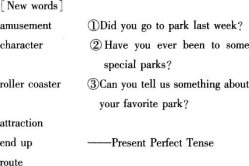当前位置:首页 → 职业资格 → 教师资格 → 中学英语学科知识与教学能力->设计任务:请阅读学生信息和语言素材,设计一节课的教学方案。教
设计任务:请阅读学生信息和语言素材,设计一节课的教学方案。教案没有固定格式,但必须包含下列要点:
●teaching objectives
●key and difficult points
●major steps and time allocation
●activities and justifications
教学时间:45分钟
学生概况:某城镇普通中学初中二年级学生,班级人数40人,多数学生已经达到《义务教育英语课程标准》(2011年版)三级水平。学生课堂参与积极性一般。
语言素材:
Have you ever been to Disneyland?
Most of us have probably heard of Mickey Mouse,Donald Duck,and many famous Disney charac-ters.Perhaps we have even seen them in movies.But have you ever been to Disneyland?In fact,there are now several different Disneyland amusement parks around the world.
Disneyland is an amusement park,but we can also call it a theme park.It has all the normal attrac-tions that you can find at an amusement park,but it also has a theme.The theme,of course,is Disney movies and Disney characters.For example,you can find a roller coaster in most amusement parks,but in Disneyland,the theme of the roller coaster is Disney characters.This means that you can find Disney characters all over the roller coaster.You can also watch Disney movies,eat in Disney restaurants,and buy Disney gifts.And you can see Disney characters walking around Disneyland all the time!
Have you ever heard of a Disney Cruise?These are huge boats that also have the Disney theme.You can take a ride on the boat for several days,and you can sleep and eat on board.There are also many at-tractions on board,just like any other Disneyland.You can shop,go to Disney parties,and eat dinner with Mickey Mouse!The boats take different routes,but they all end up in the same place.That is Disney's own island.
It is just so much fun in Disneyland!
Teaching Objectives:
(1)Knowledge Objectives
①Students can master some new words and phrases.
②Studentscan understandthePresentPerfect?Tense,and know how to ask and answer the sentence?pattern"Have you ever been to...?"
(2)Ability Objectives
Through group work,students can use the Present?Perfect Tense to talk about their past experiences in?spoken conversation.
(3)Emotion Objectives
①Students can get some ideas about the cultural?differences between China and Western countries.
②Through talking about the places having been to,students can learn to care about others.
Teaching Key Points:
①Words and phrases
②Grammar:Present Perfect Tense
Teaching Difficult Points:
①How to use the Present Perfect Tense to talk about?past experience.
②How to identify the differences between Present?Perfect Tense and Simple Past Tense.
Teaching Procedures:
Step 1 Lead-in
Use three questions to lead in the teaching topic:
①Did you go to park last week?
②Have you ever been to some special parks?
③Can you tell us something about your favorite?park?
Through these three questions and answers,use The?Simple Past Tense to lead out the Present Perfect?Tense and the way of changing"be"into its Present?Perfect Tense form"been".
Require students to answer the three questions and?compare the differences.
(Justification:Create a sound?atmosphere for thefol-lowingteaching,and?help to consolidate the knowledge learned at the?same time.)
SteD 2 Presentation
①Ask students to find?phrases in this passage,and?try to guess their mean-ing together.
(Justification:Through encouraging students to guess?the meanings of new words,help students to raise a?good study habit by thinking on their own.)
②Find sentences which are in a similar form/using?the Simple Past Tense in the passage and try to un-derstand them.Then look at the picture in the text-book,students ask and answer conversations using①
②sentence structures and then make affirmative or?negative answers.
1)"Did you...?"
e.g.:Did you go traveling this summer?
Yes,I did./No,I didn't.
2)"Have you ever been to...?"
e.g.:Have you ever been to some special parks?
Yes,I have./No,I haven't.
(Justification:Through finding and analyzing the?grammar points to help students understand the?differences between Present Past Tense and Present?Perfect Tense.)
Step 3 Consolidation
Make sure students know the meaning of the new?words and experiences.Before listening to the tape,give students several questions relating to the listen-ing contents.
Listening to the video tape for 3 times.The first?time,students just listen and try to know what it tells?us;the second time,students finish the exercise in?the textbook and try to answer the questions;the?third time,check the answers.
Step 4 Summary and Homework
①Review the Present Perfect Tense through"ask?and answer questions'method"to let students know?how to describe the places they have been to.
②Translate the following into Chinese
a.从没去过迪斯尼乐园。
b.玩得愉快
c.在同一个地方
d.在船上
e.行驶不同的路线
③Write a short passage to show the most special?parks they have been to and report it to the class the?next day.
(Justification:Help students to havea deeper?memory of what have learned this lesson,and learn?to use them in real situation.)
4.Board design
Unit 9 Have you ever been to Disneyland?

有“泥土诗人”之称的诗人是()。
将下列各项按所表示年龄大小顺序排列,正确的顺序应是( )。
①不惑②垂髫③花甲④加冠⑤而立⑥古稀⑦半百
1931年,一位给人们带来光明的科学家重病的消息牵动着世界人民的心,几十名记者为他守夜。每隔一个小时就对外发布一次消息:“灯”还亮着。这位科学家是( )。
钱穆在评论中国古代某制度时说,它“可以培植全国人民对政治之兴味……可以团结全国各地域于一个中央之统治”,这一制度是()。
明朝初年强化君主专制的措施是()。
知识是个体通过与环境相互作用后获得的( )。
《诗经》中描绘了一个美丽清泠、朦胧迷茫的抒情境界,刻画诗人徘徊追思的形象,借助景物和意象含蓄委婉地表达相思和追怀之情的诗篇是( )。
在我国历史上,传统音乐与外族音乐、北方与南方音乐进行广泛交流的时期是()。
教育的本体功能之一是( )。
一个国家教育经费投入的多少最终取决于( )。